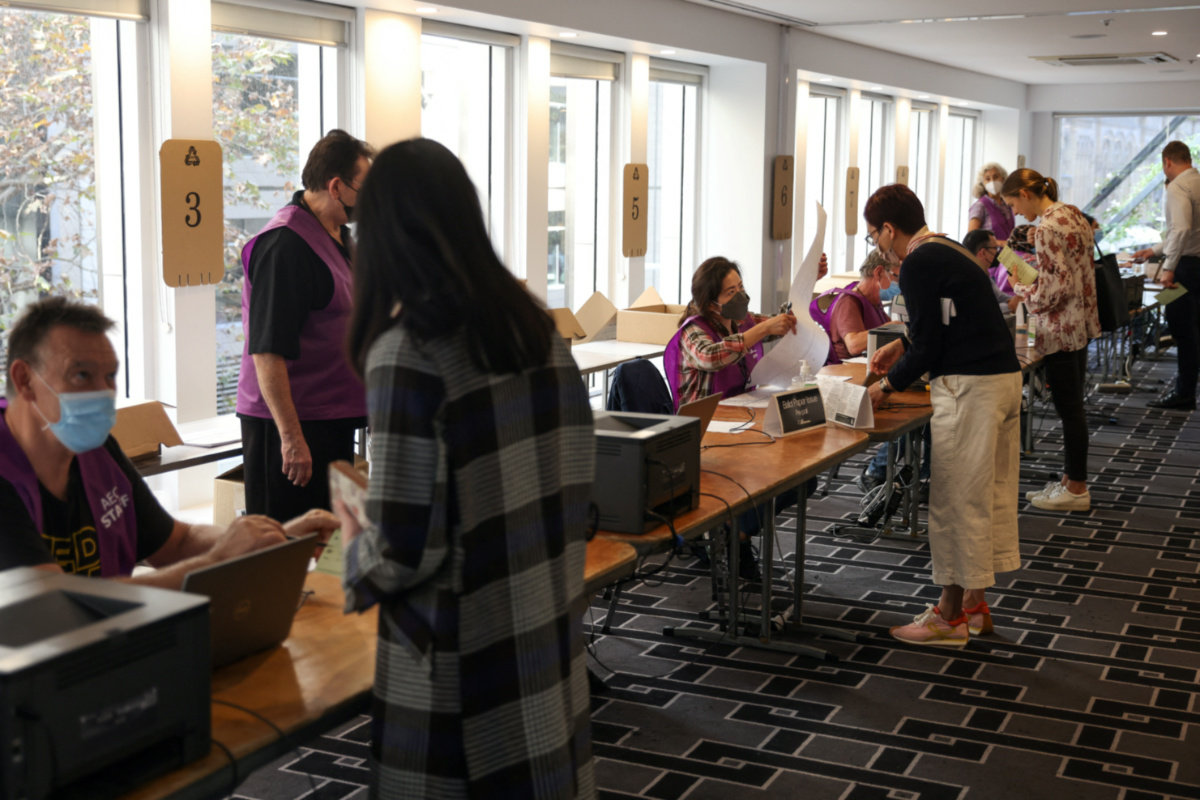Updated: 6:30pm (AEST)
Sydney, Australia
Reuters
Australian Prime Minister Scott Morrison criss-crossed the country in a final day of campaigning, insisting he could still win Saturday’s election despite polls pointing to a change of government or hung parliament.
Morrison and Labor Opposition leader Anthony Albanese targeted marginal seats in the final 48 hours of the six-week campaign as data showed wages growth being outstripped by inflation, and record low unemployment – fodder for competing claims on who would best manage the economy.

Staff members assist voters arriving to cast their ballots ahead of the national election at an Australian Electoral Commission early voting centre, in the Central Business District of Sydney, Australia, on 17th May. PICTURE: Reuters/Loren Elliott/File photo.
More than half the votes had already been cast by Friday evening in the compulsory voting system, with a record 8 million pre-poll and postal votes, the Australian Electoral Commission said.
An Ipsos opinion poll published by the Australian Financial Review showed Labor leading Morrison’s ruling Liberal-National coalition 53 per cent to 47 per cent on a two-party preferred basis, where votes are ranked by preference and distributed to the highest two candidates.
Labor’s primary vote shrunk to 36 per cent to the coalition’s 35 per cent, with minor parties and independents attracting nearly a third of voters, raising the prospect of a minority government.
Morrison, in a blitz of media interviews on Friday morning, said he could still win, and pointed to his economic competence.
“What I’ve demonstrated over these last three years – not everybody’s agreed with me…and not everybody likes me – but that’s not the point. The point is, who can manage the nation’s finances to keep downward pressure on rising interest rates, downward pressure on cost of living?” he said on ABC News Breakfast, before campaigning in Western Australia.
Albanese campaigned with former Labor Prime Minister Julia Gillard in the South Australian capital of Adelaide, broadening his attack to the government’s record on gender equality and climate change, issues championed by independent candidates.
Gillard, Australia’s first woman Prime Minister and an international campaigner for women’s leadership, urged women to vote Labor, saying, “I am very confident it will be a government for women.”
In 2010, after the election delivered a hung parliament, Gillard only formed government after extended negotiations with independents and minor parties.
Several so-called “teal independents” are challenging key Liberal-held seats, campaigning for action on climate change after some of Australia’s worst floods and fires, and criticising the government on integrity and equality.
Morrison pledged to become “inclusive and bring more people with us” if re-elected, after polling showed his personality could be a hurdle for the Liberal vote, particularly women.
Another challenge for the major parties is a $A40 million advertising blitz by billionaire Clive Palmer’s United Australia Party, which is fielding candidates nationally.
ABC election analyst Antony Green said unlike the previous election, Palmer’s advertising blitz hadn’t singled out Labor for attack, which could impact preference flows and the result.
Election rules were changed on Friday to allow telephone voting by voters who test positive for COVID-19.
We rely on our readers to fund Sight's work - become a financial supporter today!
For more information, head to our Subscriber's page.
Cost of living battles
The government has played up its credentials in supporting the economy through the COVID-19 pandemic, pointing to data on Thursday that showed Australia’s jobless rate fell to 3.9 per cent in April, the lowest in 48 years.
Labor said businesses had struggled to find workers after borders were closed and highlighted other data that showed wages had grown just 2.4 per cent, the lowest since 1998. It wants to boost the minimum wage to keep pace with inflation of 5.1 per cent.
“Australians are doing it tough, they know that wages have gone backwards by 2.7 per cent,” Albanese said on Friday.
Asked about the chance of no clear result on election night as independents drew votes, he urged people to vote Labor instead.
“There’s three more years of the same or there’s myself, who wants to bring the country together, who wants to be inclusive, wants to end the division, wants to end the climate wars,” he said.






